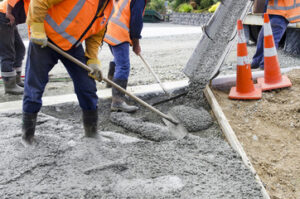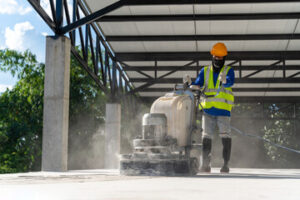Concrete is one of the most durable materials in construction. Routine use, however, can damage it if not repaired properly. Damaged concrete compromises the structural integrity of buildings and structures, diminishes its appearance, and creates hazardous or unsafe conditions.

Concrete contractors bring specialized knowledge, skill, and experience to concrete projects. Their responsibilities include project planning, pouring, finishing, and quality control.
Concrete is an economical construction material that offers many long-term benefits for businesses. It can be used for everything from foundations to paving and offers the durability necessary for projects of all sizes. It also helps businesses meet their budgetary constraints by reducing long-term costs for maintenance and repairs.
Working with knowledgeable concrete contractors is a crucial component to the success of any commercial construction project. They can help a business choose the best concrete mix to suit its needs while staying within budgetary constraints. They can also assist a business with the planning and design process, which can save both time and money in the long run.
Professionals have the knowledge and experience to handle a wide range of concrete projects, including foundations, slabs, and pavements. They understand the nuances of mixing, pouring, and finishing concrete and use high-quality materials for an exceptional result. They can also complete projects more quickly and efficiently than DIYers, saving both time and money.
In addition to providing high-quality concrete, professional concrete services can also reduce costs by avoiding waste. They have the equipment and experience to properly measure and place concrete, minimizing waste and over-pouring. They also know how to mix concrete properly and avoid costly mistakes that can occur with a DIY approach.
Another way that concrete contractors can cut costs is by avoiding additional expenses such as vapor barriers and styrofoam layers. They can also recommend alternative aggregates to save on costs. Finally, they can save on labor costs by scheduling work during off-peak times.
When considering the cost of concrete, a business must factor in delivery fees and fuel surcharges, which can significantly increase its overall costs. By comparing quotes from several different companies and shopping through a concrete e-commerce platform, a business can minimize its delivery fees and fuel surcharges.
Additionally, a business should consider the costs of recycling its concrete waste. Instead of paying to dispose of it in a landfill, it can send it to a recycling plant for an average cost of US$8 per tonne. This can help the business avoid costly landfill charges while also reducing its carbon footprint.
High Quality
Concrete is strong and can last a long time, but it only works properly when it’s mixed and poured correctly. Professional contractors are trained to spot problems with concrete and know how to fix them before they turn into bigger issues. This saves clients money and makes sure that the final product meets their expectations.
Contractors also have the skills to plan and execute large-scale concrete projects. They collaborate with architects, engineers, and clients to assess project requirements and determine the type and quantity of concrete needed. They prepare the site by clearing debris and leveling the ground before pouring, ensuring that the concrete is evenly spread. They may also construct forms or reinforcements for the concrete to ensure that it’s strong enough and will meet specifications.
They also oversee the finishing and curing processes, which involve using different techniques to achieve the desired texture and appearance of the finished concrete. This can include smoothing the surface with trowels, adding decorative elements, and applying sealants. They also keep the concrete at the ideal temperature and moisture level to ensure that it hardens properly.
Lastly, they inspect and repair concrete structures, including foundations, walls, floors, and driveways. They can replace broken sections or seal cracks in existing concrete to prevent further damage. This prevents further deterioration, saves on expensive repairs, and keeps buildings safe for occupants.
When choosing a concrete service, be sure to research their previous work and look for testimonials from past customers. They should be able to provide you with a cost estimate and timeline of completion.
It’s also important to choose a contractor that has the proper insurance and bonding information. This will protect you in the event of an accident or injury on the job site. A reputable concrete contractor will have worker’s compensation insurance for their employees and liability insurance for property damage. They should also be able to provide you with a list of references that you can contact. This is a good indication that they are a reputable company that takes their business seriously.
Time-Sensitive
Concrete construction projects are often time-sensitive, and it’s important to work with contractors who can meet deadlines. During the vetting process, ask potential concrete contractors about their past experience and track record. They should be able to provide examples of previous jobs and share their approach to managing time-sensitive tasks. They should also have a plan in place to address any challenges that may arise, such as weather conditions or material availability.
Concrete contractors are highly specialized professionals who specialize in all aspects of concrete construction, from pouring to finishing and repairs. Their job duties include working closely with architects, engineers, and project managers to develop concrete construction plans that satisfy the design specifications and budget of each project. They also perform site preparation, which includes excavation and grading. Finally, concrete contractors are responsible for constructing and repairing concrete structures, including foundations, slabs, walls, and columns.
When hiring a concrete contractor, look for one who has earned certifications from reputable industry organizations. This will ensure that they follow the latest construction standards and best practices. They should also have extensive knowledge of different concrete materials and their characteristics. This will allow them to choose the right mixture for each specific application, ensuring that the finished product meets all requirements.
It is also important to evaluate the contractor’s communication skills and safety policies. They should be able to communicate effectively with clients, engineers, and architects throughout the project. Additionally, they should have a strong commitment to site safety and compliance with all local building codes.
Choosing a concrete contractor with good customer service is essential. They should be able to respond quickly to inquiries and questions, and they should be able to explain the process clearly. In addition, they should be able to identify potential issues early and recommend solutions.
Keeping up with concrete maintenance is essential to extending the life of your home. Using professional concrete services can help you avoid costly structural and aesthetic problems down the road. Concrete is a durable material that can last for years if properly maintained. However, if you notice any signs of damage or deterioration, it’s important to call a concrete professional right away.
Accurate Calculations
Concrete is an essential part of any construction project, and accurate calculations are vital to ensuring the success of your project. Professional concrete services are familiar with the complexities of calculating coverage and quantity, resulting in cost-efficient projects with minimal waste.
To calculate the volume of concrete needed for your project, start by measuring the length, width, and depth of the area to be filled with concrete. Multiply these measurements to find the total area. Then, convert the area to cubic yards by dividing it by 27 (since one cubic yard is equal to 27 cubic feet). This figure will help you determine the exact amount of concrete required for your project.
Using online concrete calculators will make this process even easier. These calculators will provide you with the precise amount of concrete you need for your project, preventing any costly errors from arising. It’s also important to remember that there will be some waste during the pouring process, so it’s recommended to add an extra 10-20% to your calculation. This buffer will account for spillage, uneven surfaces, and human error.
In addition to using digital technology, professional concrete contractors are well-versed in the nuances of concrete mixing and application. They are also familiar with the latest advancements in admixtures and additives that can enhance the strength and durability of concrete. These specialized knowledge and skills allow them to create the best possible mixtures for each individual project, saving you time and money.
Another benefit of working with professional concrete services is their guarantee that their work will be of the highest quality. Whether you need a new foundation for your home or a sidewalk for your business, these experts will ensure that the finished product meets all your expectations. Additionally, they will stand behind their work if any problems arise. If they fail to meet their promises, they will come back and fix the issue at no additional cost to you. This level of service is unmatched by many other companies in the industry.
